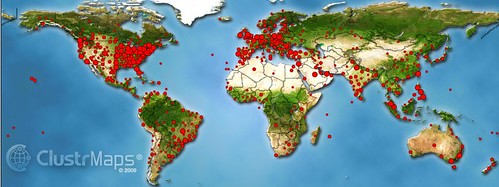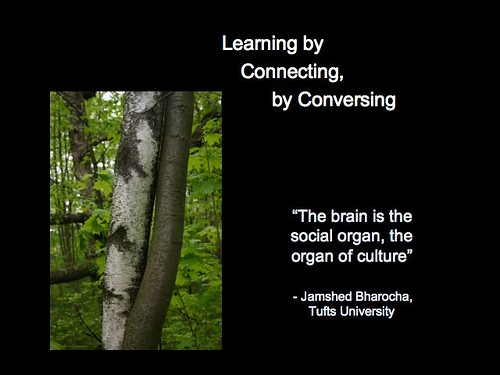"Open educational resources are materials used to support education that may be freely accessed, reused, modified and shared by anyone."
Background
Inspiration for this post was attendance at the one day MEDEV workshop From curiosity to confidence: sharing what it takes to ‘go open’ with learning and teaching resources. Keynote speaker Kieran McGlade (Queen’s University Belfast) kicked off proceedings with an Introduction to open educational resources (OERs) and open educational practice (OEP). Megan Quentin-Baxter (MEDEV) and Jane Williams (University of Bristol) prompted useful discussion not just on copyright issues in relation to OERs but also on the very important ethical question of consent (i.e consent of lecturers, participants and patients for the re-use and distribution of OERs).
Image Courtesy of opensourceway under the CC 2.0 SA licence
Sangeetha Rajoo and Caesar Wek (Both, Queen Mary University
London) demonstrated the good work that they have done creating open
educational resources and outlined their approaches and the issues that they
have come across. In the final session of the morning Paul Scott (Hull York
Medical School) gave an important insight into institutional approaches to
developing OERs, emphasizing the importance of planning early from the
beginning to ensure all resources do not infringe copyright and that consent is
obtained before the creation of resources.
Suzanne Hardy (MEDEV) rounded off the session in the
afternoon with many practical tips and advice on tools to use that will aid the
development of OERs.
Further Reading
Further Reading
With a business hat on one of the prime motives quoted to
justify the creation of OERs is that it is good marketing for the institution
and it allows the institution and/or the individual to showcase their skills
and knowledge, enhance their reputation and encourage students onto the
standard regular courses and programmes that are offered. This may be so, however
I have not been overly convinced about the cost effectiveness and
sustainability of this approach for the institution and the effectiveness of OERS
in being re-used and re-adapted for teaching and learning.
To help improve my understanding and come to an effective
rationale to make the case for creating Open Educational Resources for use in
Higher Education and beyond I’ve also recently read two articles on the topic.
i) Positioning the OER Business
Model for Open Education and ii) Extending
the Territory: From Open Educational Resources to Open Educational Practices.
Accepting there are merits in the motivation mentioned above,
for me it is not yet clear if this alone is a strong enough basis for a Strong OER
commitment that fits into the overall strategy of a Higher Education
institution and further how it fits in with the notion of still trying to gain
competitive advantage over other Institutions who you are collaborating with in
a spirit of altruistic educational endeavour. I probably need to examine in
more detail the philosophy and ‘success’ of an institution like MIT with their renowned open courseware
(OCW) programme (See MIT’s
Presidents message about OCW), but attendance at the workshop combined with
the further reading has helped me to crystallize a number of reasons that will
help make the case for institutional backing for creating and developing open
educational resources for use in Higher Education.
The First Argument
The first argument is that as a leading educational institution it is in the public good to share knowledge globally for the benefit of citizens of the world. To quote Susan Oldfield from the MIT OCW website “We do not yet know the full potential of OCW and its ultimate impact on global education. But it is clear to us that by thinking of knowledge as a public good for the benefit of all, and acting on this philosophy through OpenCourseWare, we can make a difference”.
The First Argument
The first argument is that as a leading educational institution it is in the public good to share knowledge globally for the benefit of citizens of the world. To quote Susan Oldfield from the MIT OCW website “We do not yet know the full potential of OCW and its ultimate impact on global education. But it is clear to us that by thinking of knowledge as a public good for the benefit of all, and acting on this philosophy through OpenCourseWare, we can make a difference”.
The early pioneers had an obvious passion for this and for
many others they may just need some encouragement by other practising
colleagues to convince them that contributing to global education is a
wonderful thing.
To stiffen this mentality up it could be argued especially
in the UK that given that lecturers and the institution are funded in large
part by the public purse then lecturers are honour bound to spread their
educational resources to the wider public.
Belief in the value of Open Educational Practice is the Key
Open Educational Practice when defined is often closely
intertwined with Open Educational Resources, for me it is much wider than that.
It is sharing and engaging widely and openly. It involves network learning and making
use of all the wonderful social networking tools at our disposal to engage and
connect with other people on a local, national and global basis. This video Community as Curriculum
and Open Learning from Dave Cormier and this video Networked Student from
Wendy Drexler best help to explain the concept.
Many individual lecturers in Higher Education especially at
this time may question the mentality of embracing an open educational ethos and
making resources that they create free, open and available for use and re-use
by both teachers and students. To persuade unconvinced staff, to me it is
essential that staff first buy into the notion of open educational practice.
Once convinced, the notion of creating open educational resources will
naturally become part of the open educational mindset.
Having myself been exposed to the open educational concept
primarily through the great connectivist movement (see what is
connectivism?) my own sharing
behaviour has been changed as I have been convinced by the enlightened early
believers of the merits of being an
active participant in a wider national and international open learning
community. The massive educational benefits I have freely received has
encouraged me to contribute my own knowledge skills, ideas and opinions freely
and openly thus playing my part in helping others, as others have helped me.
We need to emphasize that the materials are free and open in
the context of education and are for non-commercial gain with you the creator
maintaining control of all aspects of copyright including accreditation and
sharing and re-use restrictions. This is ideally done using a Creative Commons license, but
part of the preparation will include ensuring all material used has no
copyright restrictions and that ethical, moral and legal consent for the
inclusion of third parties in for example video resources is obtained.
Mitigating the effort of creating OERs
I question the cost effectiveness and the sustainability
because it is not monetarily cheap to produce sophisticated specific resources
or timewise cheap to adapt and prepare materials for use as an OER. However, if
you are persuaded by the need to act in the public good, the obligation to make
the most of your publicly funded time or you really can see the massive
advantages of giving and receiving open educational resources and sharing
knowledge and ideas as part of a global education community, then with some
preparation and clear intent at the outset the job of creating OERs for use in
your regular teaching and learning and then for further sharing and re-use can
be made easier in a number of ways. Consider the following:
1. Within most Higher Education institutions there will be
an OER Champion. It will be important to work with them and within your own
institutional guidelines and policies. There are many legal and ethical issues
to consider. Your OER Champion mindful of the circumstances at your institution
will be able to offer time saving guidance and advice and possibly a clear
checklist of things you need to do to prepare resources for open educational
use.
2. Addressing key legal and ethical issues mentioned above
before starting development of an OER will include i) ensuring that you are the
copyright holder or that you have copyright clearance to offer certain
material within an OER ii) clearly
stating the terms upon which you as copyright holder will allow the OER to be
used, shared or re-used (a creative
commons license makes this a simple process) and iii) gaining consent of
participants in OERs before creation of said OERs (and with a clear explanation
as to its purpose and use).
3. With an OEP mindset you’ll be more inclined to take
advantage of OERs produced by others. Your eyes will be opened to a wealth of
material freely available. This will inspire you to understand what is possible
and encourage you to contribute yourself when the time is right.
4. There are many free tools out there to help not only the
development of OERs but resources for your own regular teaching and learning.
Once again opening your mind to these tools will further encourage you to understand
that with good planning and preparation making resources available freely and
openly for use and re-use although requiring some effort may not be too onerous
a task.
Practical Help
During the MEDEV workshop Suzanne Hardy signposted some
great tools for sourcing open educational resources during the workshop. Some useful tools highlighted are listed here.
- Xpert - University of Nottingham (e-learning repository and attribution tool)
- Flickr Advanced Search (tick the creative commons box for OERs)
OERs in Action
Here are a couple of useful examples of OERs that i am familiar with:
- QMUL: Drug of the week
- DMU Sickle Cell Anaemia
And Finally Dissemination
There will be many OER Repositories such as Jorum to upload your resources too, but if
you want to try and spread the word about your OERs far and wide this
search engine optimisation guidelines article by Dr Vivien Rolfe and Dr Simon Griffin uses the DMU
Sickle Cell Anaemia project
mentioned earlier to illustrate a step by step approach to gaining maximum
exposure for your resources.
PS:If you don't know where to start with connectivist teaching and learning, contact me and i'll suggest a suitable starting point.







No comments:
Post a Comment